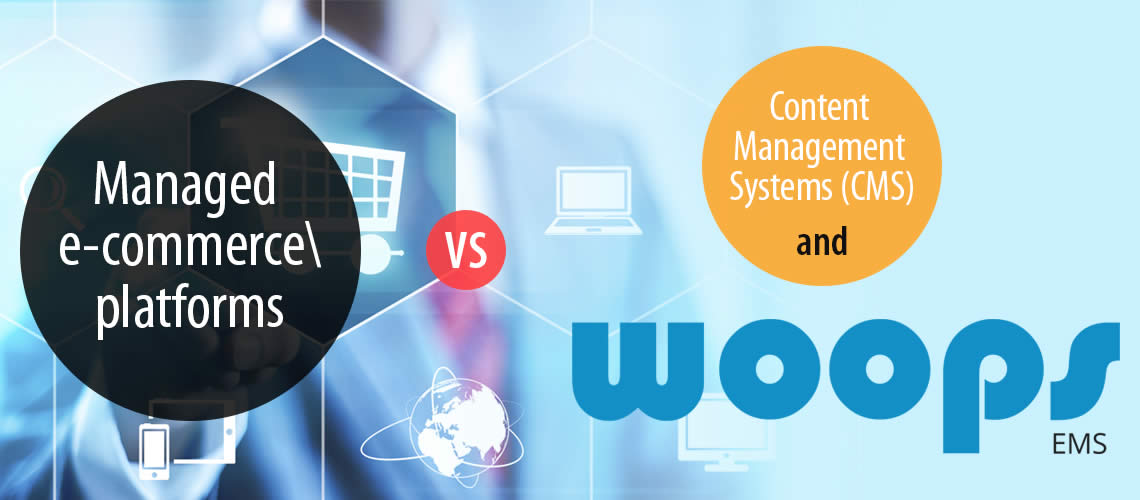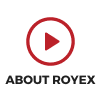
Managed e-commerce platforms vs. Content Management Systems (CMS) and Woops EMS (2025 Edition)
A huge number of e-commerce platforms are emerging these days as the competition of running online e-commerce business is increasing at a rapid pace. It is getting difficult to choose the right platform or tools when it comes to starting your own online e-commerce business. And it gets more complicated when you don't have any technical or background knowledge of the platforms, services or the tools required to start the business.
For setting up your e-commerce website, we usually have two options: 1.) To go for prebuilt e-commerce platforms, commonly known 'hosted solutions and the second one, 2.) to use open source CMS (content management system), like Magento, Opencart, WooCommerce.
For open source, you need to have your own hosting server and you to setup everything yourself. While on hosted solution, you just have to pay the service, and after basic info setup, start uploading your products instantly. These services usually charge on monthly basis ; otherwise, they charge on annual terms.
The choice to go for a particular solution depends on your needs and your technical understanding of the platforms.
Below is a list of benefits of both platforms, which might assist you in choosing between the two, based on your requirements:
Advantages of Hosted e-commerce platforms
Less maintenance required:
There is no coding expertise required, consequently getting rid of the need for an advancement team. Also, the hosting is shared, which lowers the server expenses.
Better technical assistance:
Most online shop service providers have an active tech-support group to help users with any concerns that may emerge.
It's less complicated to work with:
The back-end for most of these platforms is user-friendly and is built for ease of use having in mind the users with limited technical knowledge.
Advantages of using a Content Management System( CMS).
Much better capability:
A number of plugins, add-ons, and themes available for content management systems enable the addition of advanced features that would not be possible when it comes to self-hosted platforms.
Much better customizability:
Content management systems permit the flexibility of adding/modifying features as well as constructing a tailored design exclusive to one's brand name. They likewise enable continuous improvements and enhancements to the user experience on the website, which plays a significant function in today's highly competitive e-commerce area.
Can support large stores and sophisticated sites:
Content Management Systems, being self-hosted, do not have a limitation to the number of products or classifications enabled so that they can handle much bigger stores along with sophisticated websites.
However, Woops Ecommerce Management System (EMS) inspires originality completely. It is a hosted e-commerce option, so it has all features of other hosted e-commerce option like less development or maintenance, better technical assistance, less complicated to operate. At the same time like other CMS, it has features like better capability, better customizability and can support large shops and advanced sites.
Why Royex Technology Is the Best Choice for Your Managed eCommerce Platform
Running an eCommerce store can be exciting, but it also comes with its fair share of challenges. That’s why having a reliable partner for your managed eCommerce platform is so important. Royex Technology takes the stress out of managing your online store. We handle the technical side, updates, security, and performance, so you can focus on what matters most—growing your business and delighting your customers.
What makes Royex Technology the best choice is our hands-on approach. We don’t just set up your store and walk away. We track performance, refine strategies, and ensure that everything operates seamlessly. From seamless checkout experiences to fast-loading pages, we ensure your customers enjoy a smooth and secure shopping experience every time. Our goal is simple: turn your eCommerce platform into a growth engine for your business.
We also bring local expertise to the table. As a trusted eCommerce website development company in Dubai, we understand the market and the unique challenges businesses face. Whether it’s integrating payment solutions, managing inventory, or improving site performance, we provide solutions tailored to your needs. You get a platform that’s not just functional, but smart, scalable, and ready for growth.
We prioritize results that are clear and measurable. Our team provides insights, analytics, and regular updates to keep you informed. You’ll always know how your store is performing and where there’s room for improvement. When Royex Technology manages your eCommerce platform, you gain peace of mind, expert guidance, and a partner dedicated to your business’s success. If you are interested to develop your own ecommerce website, please contact at +971566027916 or mail at info@royex.net
FAQs
1. What is a managed e-commerce platform?
A managed e-commerce platform is a service that handles all aspects of your online store for you. Instead of managing all the technical details yourself—such as hosting, security, updates, and performance—the platform manages them for you. You can focus on selling your products, creating marketing campaigns, and serving your customers, while the platform keeps everything running smoothly in the background.
Think of it like having a team of experts looking after your store 24/7. They ensure your website loads quickly, remains secure, and functions flawlessly on any device. Some platforms even assist with inventory management, payment processing, and analytics, giving you a clear picture of how your store is performing.
In short, a managed e-commerce platform takes the stress out of running the technical side of your store, freeing up your time and energy to focus on growing your business.
2. How is a CMS different from a managed e-commerce platform?
A CMS, or Content Management System, is mainly designed to help you create, manage, and organize content—like blog posts, pages, or media—on your website. It gives you control over your site’s content but usually doesn’t handle complex eCommerce functions out of the box. You often need extra plugins or tools to sell products, manage inventory, or process payments.
A managed e-commerce platform, on the other hand, is built specifically for online stores. It comes with everything you need to sell online—product catalogs, shopping carts, payment gateways, and order management—all managed for you. It’s more “ready-to-go,” but you might have less flexibility compared to a CMS if you want to customize every detail.
In short, think of a CMS as a flexible content hub you can expand into a store, while a managed e-commerce platform is a complete online shop that’s already set up for selling.
3. What is Woops EMS?
Woops EMS is an enterprise management system built to streamline e-commerce operations with ease and efficiency. It combines inventory, orders, and customer management into one dashboard. Think of it as a tool to make your e-commerce business run smoothly behind the scenes.
4. Which one is easier for beginners?
Managed e-commerce platforms are usually the easiest for beginners. They come with templates, pre-built features, and support. A CMS or Woops EMS can be more complex but offers more flexibility if you’re ready to invest time learning.
5. Can I customize a managed e-commerce platform?
Yes, but customization can be limited compared to a CMS. Most platforms let you change designs, add apps, or tweak settings, but deep code-level changes are often restricted.
6. Is CMS better for large businesses?
Not always. A CMS can be great for large businesses that need full control and unique features. But it requires more maintenance. For a growing business, combining a CMS with tools like Woops EMS can give both flexibility and operational efficiency.
7. How do I choose between them?
It depends on your needs. If you want simplicity and a quick setup, go for a managed e-commerce platform. If you want full control, a CMS may be better. And if managing operations is a priority, Woops EMS adds valuable support.





